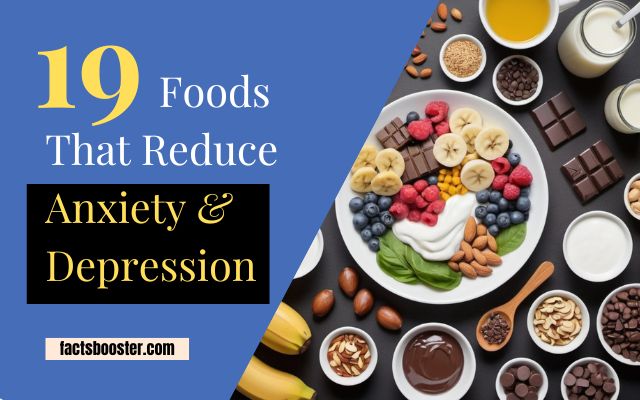Anxiety and depression affect millions, creating a relentless quest for relief. Remarkably, the answer might partly lie in your kitchen. Scientific evidence has increasingly supported the notion that your dietary choices can dramatically impact your mental health.
This article will unveil foods that reduce anxiety and depression, offering nutritional support for your brain’s well-being. You’ll explore serotonin-boosting nutrients and mood-boosting foods that serve as cornerstones of an anxiety-reducing diet.
Key Takeaways:
- Scientific Link: Understanding how diet influences mental health through serotonin and other neurotransmitters.
- Nutritional Support: Identifying foods rich in omega-3 fatty acids, antioxidants, and vitamins that combat anxiety and depression.
- Incorporation Tips: Practical advice on integrating these depression-fighting foods into your daily routine for better mental well-being.

Connection Between Diet and Mental Health
Scientific insights have unveiled that mood-boosting foods can significantly sway one’s mental state. Nutrients found in these dietary choices elevate serotonin levels and other vital neurotransmitters, enhancing overall well-being. This connection underscores the gut-brain axis’s pivotal role in mental health, offering a promising avenue for nutritional support against anxiety and depression. (1)
Foods That Reduce Anxiety And Depression
Embarking on a journey towards better mental health involves not just therapeutic practices but also the foods we consume. Foods rich in serotonin-boosting nutrients, vitamins, and antioxidants offer a natural way to combat anxiety and depression.
Each category of food plays a specific role in this battle, from mood-boosting foods that energize our body and spirit to foods that reduce anxiety and depression through nutritional support.
Let’s dive into a curated list that spans from the depths of the ocean to the lushness of the land, showcasing how an anxiety-reducing diet can be both a shield and a weapon in maintaining our mental well-being. (2)
1. Fatty Fish
Fatty fish stand out as a powerhouse for omega-3 fatty acids, essential nutrients proven essential for brain health. These fats not only bolster brain function but also play a pivotal role in production of serotonin, a key neurotransmitter linked with mood stabilization. Salmon, with its rich omega-3 content, emerges as a prime example, offering a delicious and effective way to enhance mental well-being.
Read more:
2. Leafy Greens
Leafy greens are packed with magnesium, a nutrient essential for brain function, impacting your mood significantly. Foods like spinach and kale not only offer nutritional support for mental health but also play a crucial role in stress reduction.
3. Eggs
In eggs, choline has been identified as a critical nutrient for brain health and mood stabilization. This essential component aids in the production of neurotransmitters, vital for maintaining balanced mood levels. Incorporating eggs into your anxiety-reducing diet could thus offer significant nutritional support for mental health, directly impacting your well-being.
4. Turkey
Turkey, rich in tryptophan, has been shown to play a pivotal role in serotonin synthesis. This process not only fosters a sense of calm but also curtails irritability. A 2015 study underscored tryptophan’s significant impact on curbing symptoms of anxiety and depression.
5. Lentils
Lentils, rich in B vitamins and fiber, play a crucial role in stabilizing mood and energy levels. These nutritious legumes also support gut health, linking directly to the gut-brain axis—a key factor in managing anxiety and depression.
6. Oranges
Vitamin C, abundant in oranges, plays a crucial role in diminishing cortisol levels, thereby promoting brain health. Its antioxidant properties have been instrumental in stress reduction, providing a solid foundation for nutritional support in managing mental health.
7. Fermented Foods
Your gut health and mood are intricately linked, thanks to the probiotics found in fermented foods such as yogurt and kimchi. These provide nutritional support for mental health, nourishing the gut-brain axis and acting as a natural serotonin-boosting nutrient.
8. Pumpkin Seeds
Pumpkin seeds pack a powerful punch of zinc, crucial for brain health and mood regulation. Their role in neurotransmitter function cannot be overstated. For nutritional support targeting mental well-being, weaving them into your daily diet offers a simple, yet effective strategy.
9. Chickpeas
Chickpeas stand out for their tryptophan content, essential for serotonin boosting and nutritional support for mental health. This contributes significantly to stabilizing blood sugar, thus promoting consistent energy levels and enhancing mood stability, key factors in an anxiety-reducing diet.
10. Bell Peppers
Bell peppers boast a high vitamin C content, essential for reducing cortisol and managing stress. They support immune function, crucial for overall well-being and mental health. Including bell peppers in your diet can be a colorful and nutritious way to fight anxiety and depression.
11. Oysters
Oysters boast a high zinc concentration, a mineral pivotal for brain health and mood stabilization. Their nutritional value makes them an integral part of an anxiety-reducing diet. Research has underscored their efficacy; one study highlighted the link between zinc intake from oysters and a noticeable decrease in anxiety symptoms.
12. Berries
Berries have emerged as powerful allies in the nutritional support for mental health, thanks to their rich antioxidant content. A pivotal study found that blueberries, in particular, could play a significant role in lowering anxiety levels among postmenopausal individuals.
This connection underscores the broader potential of mood-boosting foods like berries to enhance our overall mental well-being through dietary choices.
13. Avocado
Avocados had been heralded for their abundance of healthy fats, pivotal for nourishing the brain and bolstering neurotransmitter function. These nutrients had proven essential in enhancing cognitive functions and uplifted moods.
Researchers identified that consumers of avocados showed marked improvements in their cognitive abilities, lending credence to the fruit’s potential in dietary strategies targeting anxiety and depression.
14. Nuts and Seeds
Nuts and seeds, rich in selenium and omega-3 fatty acids, play a pivotal role in mood enhancement. These nutritional powerhouses offer vital support for mental health. Integrating them into your snacks could be a straightforward step towards stabilizing your mood.
15. Dark Chocolate
Dark chocolate, treasured for its rich flavors, has been shown to influence brain function positively due to its flavonoids. These compounds will have bolstered mood and diminished stress levels in some individuals. However, caution is warranted as varieties high in sugar might negate these benefits.
16. Yogurt
Yogurt, packed with probiotics, plays an essential role in both digestive health and mood regulation due to its influence on the gut-brain axis. These beneficial bacteria have been shown to aid in balancing the gut microbiome, which is crucial for enhancing your overall mental well-being. For nutritional support that targets mental health effectively, integrating yogurt into your daily diet could provide a simple yet powerful strategy.
17. Bananas
You will discover that bananas, rich in vitamin B6, are essential for synthesizing neurotransmitters, which play a pivotal role in mood regulation. Their natural sugars contribute significantly to stabilizing energy levels throughout the day. By integrating this fruit into your dietary regimen, you’ll find it not only boosts your energy but also supports your mood remarkably.
18. Turmeric
Turmeric stands out for its curcumin content, noted for profound anti-inflammatory impacts on the brain. Research has verified mood enhancements linked to curcumin’s consumption. For those seeking nutritional support for mental health, integrating turmeric in daily meals might be key. Sprinkle it over roasted vegetables or blend it into your morning smoothie for an easy, serotonin-boosting nutrient boost.
19. Green Tea
Green tea has long been revered for its calming properties, largely thanks to L-theanine, an amino acid that promotes relaxation without drowsiness. This component has shown promise in diminishing anxiety and bolstering brain function.
For those seeking nutritional support for mental health, sipping on green tea in moderation could offer a serene oasis in the midst of life’s storms, fostering a sense of well-being and focus.
How to Incorporating These Foods Into Diet
Integrating mood-boosting foods into daily meals requires simple, yet creative swaps. Replace usual snacks with nuts and seeds for an afternoon lift. You could layer yogurt with berries for a nutritious breakfast parfait.
Ensuring a mix of fatty fish, leafy greens, and whole grains at dinner promotes balanced nutrition. Striving for variety ensures intake of essential, serotonin-boosting nutrients vital for emotional well-being.
Other Lifestyle Factors That Reduce Anxiety and Depression
Beyond the mood-boosting foods, committing to physical activity will amplify your efforts in combating anxiety and depression. Quality sleep each night acts as a foundational pillar for emotional resilience and mental clarity.
For a comprehensive strategy, embracing mindfulness practices can lead to significant improvements in your well-being. Embrace this holistic approach, integrating nutritious choices with these essential lifestyle adjustments, for a robust defense against the burdens of anxiety and depression.
Conclusion
Your diet significantly influences mental health. Foods rich in serotonin-boosting nutrients, like those discussed, can greatly reduce anxiety and depression. Alongside nutritional support for mental health, remember to seek professional guidance when necessary and embrace dietary changes with thoughtful balance and mindfulness for optimal well-being.


